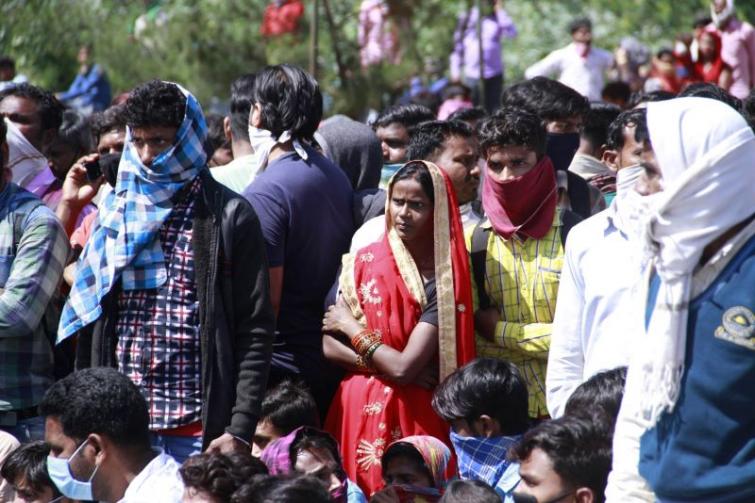
Amid COVID-19 lockdown, thousands of migrant workers gather at Delhi bus station to return home
New Delhi/IBNS: Amid Prime Minister Narendra Modi's call for a 21-day complete lockdown in the country to fight COVID-19, distressing accounts surfaced on Saturday night from the national capital where thousands of migrant workers, even while fearing for their lives due to virus spread, crowded into bus terminals around Delhi to return back to their hometowns and villages in Uttar Pradesh after they were left with no jobs, shelter or money.
Several narratives of men, women and children trekking on foot in searing heat to their villages have also surfaced after PM Modi's announcement of lockdown for three weeks.
Even as the Central and State Governments are time and again assuring of food availability to the poor sections, the migrant workers stated that since they are left with no jobs, they don't have money to pay for their shelters in Delhi.

The inter-state bus and train services are not available to the Indians making it tough for the migrant workers to travel back to their native lands though the government has urged all people to remain wherever they were.
Responding to their cry, the Uttar Pradesh and Delhi governments arranged special buses to ferry the people home.
While the UP government said it had organised 1,000 buses, Delhi Chief Minister Arvind Kejriwal said 200 DTC buses were pressed into service.
However, the way people crowded in these bus stations, as shown in several media platforms, has further increased the fear of community spread of the virus since the very purpose of social distancing gets affected due to such moves.

Delhi Police officers wearing masks could be seen in videos carrying lathis and loudspeakers in their attempt to organise the mass of people.
Speaking about the situation, Congress leader Rahul Gandhi took to Twitter to point out that the government had no contingency plans in place for this exodus.
"Out of work & facing an uncertain future, millions of our brothers & sisters across India are struggling to find their way back home. It’s shameful that we’ve allowed any Indian citizen to be treated this way & that the Govt had no contingency plans in place for this exodus," he tweeted.
Out of work & facing an uncertain future, millions of our brothers & sisters across India are struggling to find their way back home. It’s shameful that we’ve allowed any Indian citizen to be treated this way & that the Govt had no contingency plans in place for this exodus. pic.twitter.com/sjHBFqyVZk
— Rahul Gandhi (@RahulGandhi) March 28, 2020
Gandhi had tweeted earlier in the day that: "The government is responsible for this terrible condition. Bringing citizens to such a state is a very big crime."
सरकार इस à¤à¤¯à¤¾à¤µà¤¹ हालत की ज़िमà¥à¤®à¥‡à¤¦à¤¾à¤° है। नागरिकों की ये दशा करना à¤à¤• बहà¥à¤¤ बड़ा अपराध है। आज संकट की घड़ी में हमारे à¤à¤¾à¤‡à¤¯à¥‹à¤‚ और बहनों को कम से कम समà¥à¤®à¤¾à¤¨ और सहारा तो मिलना ही चाहिà¤à¥¤ सरकार जलà¥à¤¦ से जलà¥à¤¦ ठोस क़दम उठाठताकि ये à¤à¤• बड़ी तà¥à¤°à¤¾à¤¸à¤¦à¥€ ना बन जाà¤à¥¤ pic.twitter.com/mM6ktVyQSS
— Rahul Gandhi (@RahulGandhi) March 28, 2020
1.3 billion people in India are witnessing lockdown since Wednesday to respond to the Prime Minister's call to stop the spread of the deadly virus, which has crippled several nations including the developed ones.
The 21-day lockdown was called on Tuesday after people across the country observed "Janata Curfew" on March 22 in response to PM's call for the same.
So far, India registered 959 positive cases of COVID-19 and 23 deaths across the country.
Support Our Journalism
We cannot do without you.. your contribution supports unbiased journalism
IBNS is not driven by any ism- not wokeism, not racism, not skewed secularism, not hyper right-wing or left liberal ideals, nor by any hardline religious beliefs or hyper nationalism. We want to serve you good old objective news, as they are. We do not judge or preach. We let people decide for themselves. We only try to present factual and well-sourced news.







